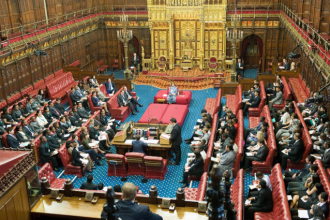John Horvat
The United Kingdom’s Labour Party government is presenting a bill to abolish the hereditary lords from the upper chamber of Parliament.
Hereditary lords are those House of Lords’ members who inherit the right to sit in the upper House based on services rendered to the realm. Many storied families have retained this right for generations. Over the years, they have gained much experience and wisdom in judging legislation and governing.
Origins and History
The House of Lords originated in the eleventh century as a council of religious and temporal leaders that the king convoked to help him govern. The sovereign called these leaders to the difficult duty of rendering “counsel and aid.” This convocation later became a more formal government institution in the thirteenth century.
In addition to hereditary lords, there are also life peers who are appointed by prime ministers to serve throughout their lifetime. Many have criticized these appointments as party cronies who receive the office as a political favor or because of donations to the party. By far, the greatest stability of the House lies in the hereditary lords who have rendered service over generations.
The lords have no legislative power but exercise an advisory role to correct legislation from the House of Commons based on their experience. They can slow down the populist passions by delaying passage and thus avert mistakes. They perform other functions that facilitate governing the country.
An Egalitarian Agenda
The move to abolish the hereditary lords is part of an egalitarian agenda to rid the nation of this institution, which is considered “anti-democratic.”
In 1999, Tony Blair’s Labour government reduced the number of hereditary lords from 750 to 92 as a temporary compromise until later legislation would abolish them altogether.
The present bill would do just that and reduce the House of Lords to a collection of life peers who will be strongly influenced by partisan politics. » Read More
https://theimaginativeconservative.org/2025/01/abolish-hereditary-lords-parliament-john-horvat.html
Abolish the Hereditary Lords in the British Parliament?
Tags:
Img Conservative

https://theimaginativeconservative.org/





